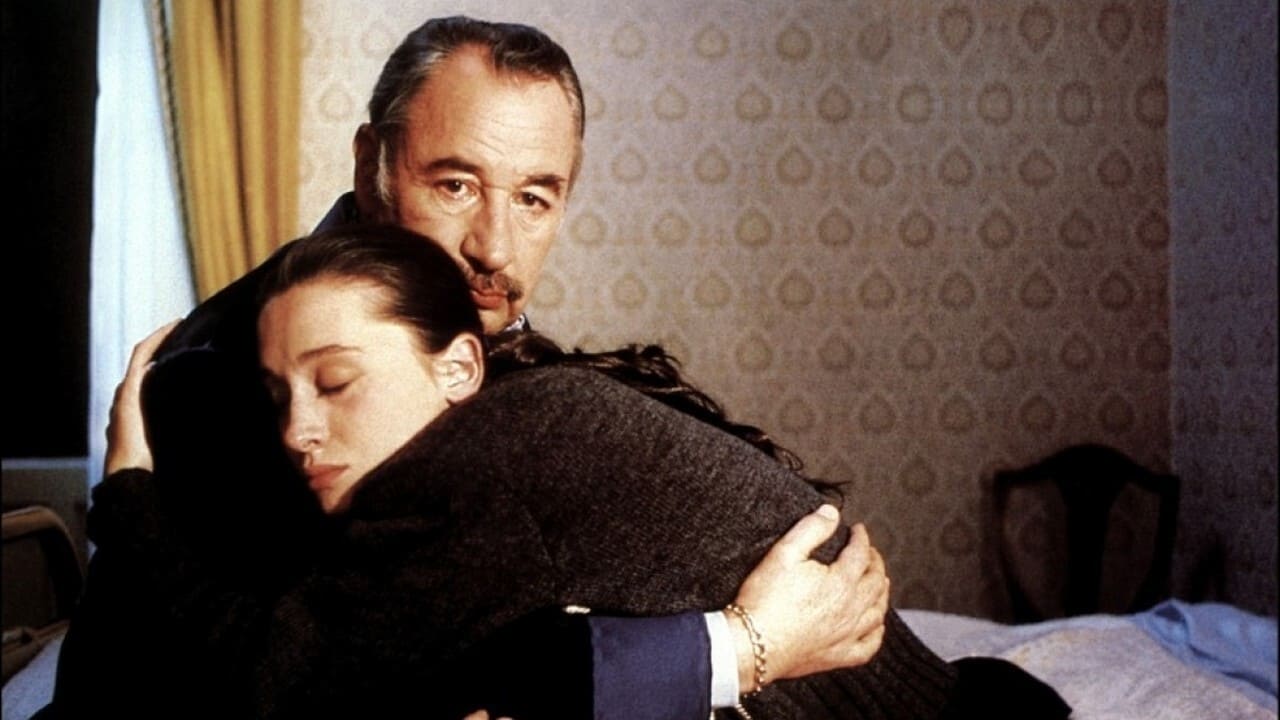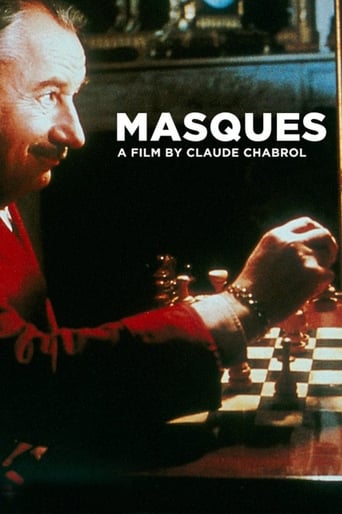

The popular television presenter, Christian Legagneur, is a man loved by his millions of fans. He is famous for the prizes given in the program to older contestants who are rewarded with exotic trips to faraway places. As any celebrity worth his fame, Legagneur is flattered when Roland Wolf decides to write his biography. The emcee proposes to do it in his country estate.Nothing prepares Roland for what he is about to find in the château-like setting. There are some other guests who seem to be part of Legagneur's coterie of friends. But Roland in reality is in pursuit of someone who disappeared a long time ago. Finding Catherine, a mysterious young woman afflicted with a strange nervous disease at the estate poses a lot of questions Legagneur is not ready to answer."Masques" directed by Claude Chabrol was shown recently on cable as a retrospective of his work. The film was a collaboration between the director and Odile Barski, who contributed a lot to his work. The film plays like an English mystery. It is elegant, and nothing seems to be what it appears. There are things Legagneur did not want to reveal, much less have a snoop among his household.One good excuse to watch "Masques" is Philippe Noiret, who as Christian Legagneur, is sly, as well as amusing. This man, a product of the media, has secrets better left untold. His collaboration in his own biography backfires on him. Robin Renucci is fine as Roland. The great Bernadette Lafont, who worked with M. Chabrol in many films, adds a bit of fun to the proceedings. Lovely Anne Brochet has the most difficult part of Catherine."Masques" is mildly entertaining, but it is not in the same league of of of the best work of the great Claude Chabrol.
... View MoreStyle Over Substance 7 I think Chabrol's decision to opt for the comedic in his sleuth in "Masques" undermines what might have been a much better and stronger movie. One of the big deficits it creates is the silencing of Roland's sister, Madeleine who, since she's central to his risk-taking, devoted work, and plotting, is the motivating force of his investigation. In fact his pursuit of justice for her demonstrates real and pretty remarkable devotion, and a love which should make her death pivotal to the film.So, how is it that Chabrol's lengthy ending vanishes her? Shouldn't her presence, in terms of justice done, have taken center stage. What we get instead is a way over the top cynical confession and a featherweight romance, which is not even in line with the film's own content.Why not end with Catherine bravely and independently testifying at Christian Legagnier's trial rather than all fluff in the arms of her friend's brother. Why can't she stand on her own on behalf of a murdered woman whose life she shared as an inmate in a bluebeard asylum which is run by the very man she can now finally destroy. Why can't her gagged life end in speech? Sisterhood is what the movie cries out for, but what we get is sister-in-law-hood with the mediator being the rather feckless brother who has nothing to offer but a nerdy smile and a Hollywood embrace, and who played chess with her tyrant while her own life was nearly being snuffed out in a junkyard--perhaps the same destruction that Madeleine experienced.An actual trial would also mean the victory of justice and reason over all the lustful and greedy emotion that the movie spirals into as we are taken from a bourgeois estate to a bluebeard dungeon. The actual ending is just more of the grotesque--a grossly staged drama, and a sugar-coated love, both of which are totally unconvincing in terms of the movie's actual development. Catherine's victory is not for her at all, although she does certainly deserve it, but for the extension of her own dependency on males. In fact, one must ask oneself in the end, whether Roland Wolf and Christian Legagnier were but members of a joint enterprise for property control? In any case, nothing resolves properly and worst of all Madeleine is disappeared forever.
... View MoreIntriguing, somewhat old-fashioned thriller where no one is quite who he seems to be (though the revelations in themselves are hardly astounding); for what it is worth, I had to make do here with a TV-sourced version sporting French subtitles! In any case, the film virtually hinges on Philippe Noiret's excellent central performance as a larger-than-life TV presenter with a weakness for luxury. Evoking Walter Matthau to a striking degree, he manages all of the protagonist's various facets (transmitting in this way his talent for manipulation) – going from the charm he exercises on audiences and collaborators alike, to the tenderness he demonstrates towards his young female charge (whom he ostensibly took on out of compassion after both her parents perished in a car crash), the ruthlessness he eventually adopts in order to achieve his goals, and ultimately the breakdown he suffers 'on air' exposing him for the contemptuous bully he really is.The plot sees a young reporter apparently approach Noiret for the purposes of writing his biography (he is actually investigating the disappearance of a woman who had been the old man's guest). At the latter's country-house, he meets and is attracted to the girl (leading a sheltered life due to her 'delicate' health), who even reciprocates his feelings – to Noiret's obvious chagrin (incidentally, Chabrol resists making him a lecher since he is only after the heroine's money). Bland Robin Renucci is only adequate as the amateur detective, but Anne Brochet's classical beauty (looking quite a bit like Emmanuelle Beart!) is ideally suited for the rather melancholy girl he determines to save from the evil clutches of her guardian. Also involved is Bernadette Lafont (middle-aged but still looking good and with hair dyed blonde) as a hanger-on at Noiret's estate who professes to tell fortunes.MASQUES basically resolves itself in a battle-of-wills between Noiret and Renucci (and eventually the former and Brochet, when it finally dawns on her that what the young man – and the lady who went missing – had been telling her all along was true). In its expose' of bourgeois double standards and numerous scenes of carefully-built suspense, then, the film emerges to be extremely typical of its director (as well as being reasonably representative of his vast body of work).
... View MoreWith Claude Chabrol's Masques, we have mystery in the country manor with, perhaps, murder in the country manner. But was there a murder and, if so, who did the murdering? Chabrol leads us to the easy conclusion, reassures us, then let's us consider the thought that there might be other possibilities. It's far better for a director's reputation that he or she turn out turgid serious films than well- crafted entertainments. Claude Chabrol is a case in point. Although his more serious films are scarcely turgid, it is his many films over the last 35 years or so, most of which can easily be called entertainments, at least by me, that sometimes cause a condescending sniff. It's nearly impossible to read comments about a Chabrol film without seeing yet another reference to his "French New Wave" credentials -- of over 40 years ago -- or to that tired old cliché of Chabrol being France's answer to Hitchcock. I admire Chabrol for one simple reason. In a long career he has continued to make movie after movie, year after year, and good ones. While most of his peers have died, or took themselves too seriously, or wandered about, or didn't produce much, Chabrol has just kept busy making movies...all kinds of movies, mysteries, murders, comedies, satires, dramas. He can be serious about serious things, if it suits him, but more often he can be amusing about serious things. His movies are literate and nearly always depend upon the mood Chabrol creates around the plot. It's clear that he's not impressed by authority figures or the conventions of smooth-running society. He's not above a bit of gruesome shock. Occasionally he can be unsettling, even sad. Occasionally he'll produce a dud or a half dud. Through it all, he keeps making movies. It seems to me that if one accepts that motion pictures are above all popular entertainment, then having one's films praised as entertainment -- literate entertainment -- should be seen as high praise. Chabrol is one of the great craftsmen of movie making, one with a point of view, and one with whom some fine actors want to work. And that brings us back to Masques, another of Claude Chabrol's literate entertainments, this one with that great actor, Philippe Noiret. Christian Lagagneur (Noiret) is the ebullient host of a popular television game show. On a pink set with a ricky-tick band playing ricky-tick music, Lagagneur hosts elderly couples who must perform a song or a dance, and then they're voted upon to see which couple wins the trip of a lifetime. He agrees to have Roland Wolf (Robin Renucci) write his biography. He invites Wolf to a weekend at his country manor where they'll work together. At the manor are Lagagneur's secretary, Colette, a smiling, watchful woman, along with his live-in masseuse and her husband, who looks after the wine. The cook is also the chauffeur, a man who is mute. "Max had tongue cancer which metastasized into his ears," explains Lagagneur to Wolf. There also is Catherine, a pale, thin young woman who wears dark glasses in the house. Catherine is Lagagneur's ward and godchild. She is a minor but just barely. We know something's up when Wolf, unpacking in his room, removes a revolver from his valise and hides it away in a closet, and then discovers a lipstick. He looks at it carefully, and then writes a large M on the mirror. He murmurs "Madeleine" and then wipes it off. It's not long before we discover Madeline was a houseguest, too, who left suddenly in the night. We witness Lagagneur's solicitude for Catherine, his insistence that doctors not see her because of the damage they caused earlier, his concern that she take the pills Colette crushes and mixes in her tea. We also witness Catherine's instability, her mood swings and her unexpected passions. Wolf interviews Lagagneur, records everything, and at night discovers secrets. Whatever is going to happen in this manor house over the weekend, we can be sure death will be involved. Philippe Noiret dominates the movie just as his character, Christian Lagagneur, dominates the manor house and the game show. Lagagneur is relentlessly full of bon homme. His overwhelming small talk gives nothing away. His charm at first can seem genuine. Noiret, whether prancing about the television stage embracing an old woman dressed in her best, glancing at his cue cards and mouthing aggressive patter about the delights of old age, or playing chess in a dark room while measuring with drooping eye lids the possible motives of Wolf, is sheer pleasure. Noiret has played so many indelible characters it's impossible to say which are best. Among my favorites are Lucien Cordier in Coup de Torchon, Major Delaplane in Life and Nothing But, Alfredo in Cinema Paradiso and D'Artagnan in the amusing Revenge of the Musketeers. And if you like stick-it-in-your-nose detectives who must have paprika on their eggs, try Claude Chabrol's Inspector Lavardin in Cop au Vin and Inspecteur Lavardin. Masques is a clever, misleading mystery with some sharp edges.
... View More